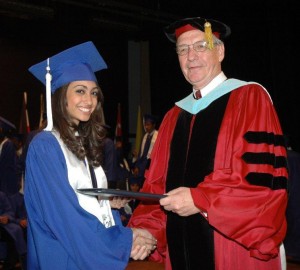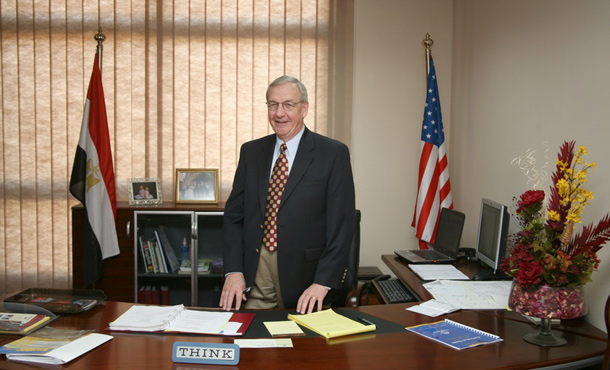When Dr. Lee M. Yoder ’63 first spotted the cover of the Feb. 28, 2011, edition of Time, he was astonished. Under the blazing headline “The Generation Changing the World,” he spotted a 23-year-old Egyptian college student he recalled as a high schooler in Narmer American College (NAC) in Cairo, where Yoder had been superintendent until 2008.
“We had school elections for student government representatives, complete with voting booths and election monitors,” Dr. Yoder recalled. As a school serving Egyptians hungry for an American-style education, NAC offered its students “their only direct experience with how democracies operate,” he added.
Time chose Sarah Abdel Rahman to be one of the seven young protesters on its cover as a result of her daily presence at the Tahrir Square protests, beginning on Jan. 25, 2011. Yoder knows Ms. Nadra Ibrahim, a Christian woman he had employed as a music teacher and a Muslim man, Mr. Adel, employed as an Arabic teacher at NAC also took leading roles in the protest. On February 4, Muslims prayed, Mr. Adel helping to lead those prayers, in Tahrir Square as Christians surrounded them. On Sunday, February 6, Ms. Nadra led singing on the square, as Muslims surrounded Christians, a most unusual public display of mutual support in Cairo.
The non-violent grassroots movement took Yoder by surprise. From 2000 – when Yoder was hired by an Egyptian educator, Mohamed El Rashidy, to found an American-style PK-12 school – to 2008 when Yoder wrapped up his work there, Yoder saw little possibility for Egypt’s release from dictator Mubarak’s rule. He and his wife, LaVerne Zehr Yoder ’63 did, however, grow to love Egypt and to feel welcomed by its people, regardless of their religious persuasion. In fact, 90 percent of the students in his school were Muslim, and Yoder says there was no tension between them and the heavily Christian faculty and minority segment of Christian students.
NAC grew from 20 students to 490 students by the time the Yoders left. LaVerne was the school’s founding early childhood leader, developing a new kindergarten classroom after walking into a room with only four white walls.
Although the Belleville, Pa., native had majored in history as an undergraduate at EMU and spent four decades in the educational arena as an administrator and professor, he had never been to Egypt and knew little about the country.
A conversation 11 years ago with New York educational consultant Dr. Rollin P. Baldwin about Egypt intrigued Yoder. He learned that an Egyptian family that ran a series of private schools was seeking a superintendent to open an American-style school in Cairo. So Yoder flew to Egypt for a week in March 2000.
After meeting the owners – a father and his eight daughters – Yoder spoke to prospective parents, answering questions about what an American school would be like. “I was talking off the top of my head based on my experiences in secondary education teaching in the Philadelphia area, and relying on my master’s and doctoral work at Temple University,” Yoder recalled. “I simply talked about the critical thinking, investigation, inquiry, problem-solving and writing approach on how we do education.”
Satisfying both the school’s owners and parents, Yoder returned home to Harrisonburg, VA with a signed contract, to work directly with The Mohamed El Rashidy Family of educators.
That fall of 2000, with a total of 20 students in grades 9 and 10, the Narmer American College (NAC) opened on the grounds of the related Maadi Narmer National School. Yoder’s eyes were quickly opened to a significant educational divide. He was teaching both English and world geography that first year, and in one of the latter classes he and his students were discussing the Palestine-Israeli issue.
He asked one sophomore, Mohamed Sinbawy, his opinion. “What, you want me to say what I think?” Sinbawy responded in disbelief.
“Yes, Mohamed, what are your own views?” Yoder wondered.
“No one ever asked me that before!”
Yoder was stunned. In response, he developed what he has dubbed a “Different Way of Learning.”
“What made our approach appealing is that the Egyptian national system is based on memorizing for a big test at the end of their schooling, very similar to a British system also in place in Egypt,” he said. “So it didn’t matter if a student goes to school, it didn’t matter what the teacher says, they just have to pass a test at the end.
“This became a much friendlier environment in which, for the first time, students took the initiative to establish a relationship with their teachers. Likewise, in the national schools parents don’t even talk to their children’s teachers,” Yoder noted.
LaVerne Z. Yoder, who taught elementary school for 27 years in the US before going with Lee to Cairo, was the school’s early childhood leader. The youngest of their three children, Lawson F. Yoder, an EMU graduate, went to Cairo with his family for the 2007-2008, where he was the first assistant principal in the middle and high school. He had taught previously for eight years at Broadway (VA) High School and another eight years at the Chapel School in Sao Paulo, Brazil. After returning to the US in 2008, he has been teaching in the middle school in Rockingham County, Virginia.

Another lure for teachers, parents and students is the sparkling first-of-its-kind Egyptian campus constructed under Yoder’s watchful eye. It is the equivalent, he said, of an $85 million U.S. school. It is located in New Cairo City, a major new development area east of Cairo that is part of the 17-million population metropolitan area. It is unique, according to Yoder, because the entire school is contained in one three-story building, encompassing nearly a quarter-million square feet, it has a capacity of 1,500 students.
Opened in August 2006, the school’s state-of-the-art facilities include 56 classrooms, music and art rooms, science and information technology laboratories, 24-hour internet access, a library, a 475-seat air-conditioned auditorium, a health clinic and a swimming pool, indoor sports court, gymnasium, a dance studio and an outdoor athletic field.
Yoder attended to all the details for a new school, from helping name the school to designing the school logo, signage and transcripts, developing the PK-12 curriculum, all policies and procedures, recruiting faculty, chairing the school accreditation efforts, participating in meetings with architects to thrash out the new school building’s design and even helping select the American school furniture imported from the U.S.
At NAC, the curriculum Yoder developed uses the Virginia Standards of Learning with local adaptations, such as modern Middle Eastern history curiously not covered by Egyptian national schools. There were field trips, including a cruise up the Nile from the temples of Luxor to the Aswan high dam. In 2008, the school’s newly founded Model United Nations team went to an international conference hosted by the Georgetown University campus in Doha, Qatar, while an art and social studies field trip took students to Prague in the Czech Republic.
Yoder and his staff sought to be extremely sensitive to religious and political issues. Each August, for two-and-a-half weeks before the school opens, Yoder conducted a faculty orientation. The message: “As North Americans, we are guests in this culture. Therefore, we promoted understanding and not ridicule or making fun of the ways of doing things.” In 2007, the faculty closed their orientation session and joined hands with Yoder and the Egyptian owners to symbolize the way Muslims and Christians can work together to develop a new school, as Isaac and Ishmael stood side by side at the death of their father Abraham, in Hebron, Palestine centuries ago.
Eighty-one percent of the NAC students are Egyptian. Others, including dual nationals, hail from 15 other countries. The faculty of 55 also has an international flavor. Among the students and faculty, there are 30 nationalities reflected in the international flags displayed on the campus and for special commencement ceremonies. The majority are certified U.S. teachers who, in addition to Pennsylvanians, hail from Illinois, Wisconsin, New York and as far south as Virginia, South Carolina, Mississippi and Texas and as far west as Arizona, New Mexico and Washington state.
Since 2008, the support of American certified teachers became too expensive for the school owners, so more Egyptian teachers have been hired and many American teachers either returned home or went to other schools, Yoder noted, adding that more local administrative leadership persons have been retained to lead the school in its next phase of development.
The spring semester 2011 at EMU, Yoder is interim co-chair of undergraduate education, along with Dr. Sandy L. Brownscombe. They are filling in for Dr. Cathy Smeltzer Erb ’85, who is on sabbatical.
From 1963 to 1975, Yoder was first a social studies teacher and then the principal of Christopher Dock High School in Lansdale, Pa. During 1975-1986 Yoder was vice president for administration and associate professor of education at EMU and then dean for academic affairs and professor of education (1992-1998) at nearby Bridgewater College. Yoder received both an EdM and an EdD in education from Temple University in Philadelphia.
